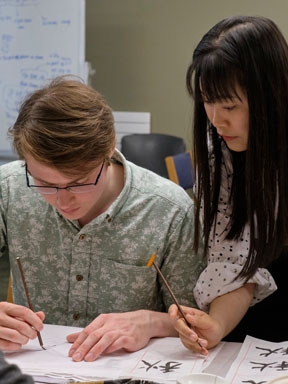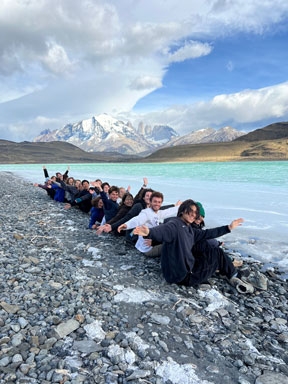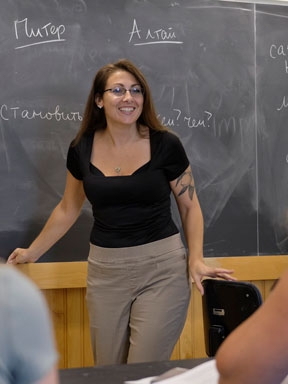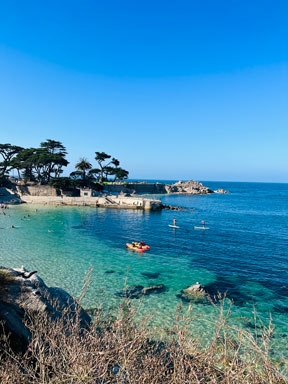The Field of Play
Athletics are an essential part of the educational and social experience at Middlebury College, from intercollegiate sports to overall health and wellness.
Sports at MiddleburyFocus your undergraduate learning with faculty who get as excited about things as you do.
Discover Vermont, a place that grounds us in history and extends to the world.
Find meaning in doing, and feel energized and ready for what's next.
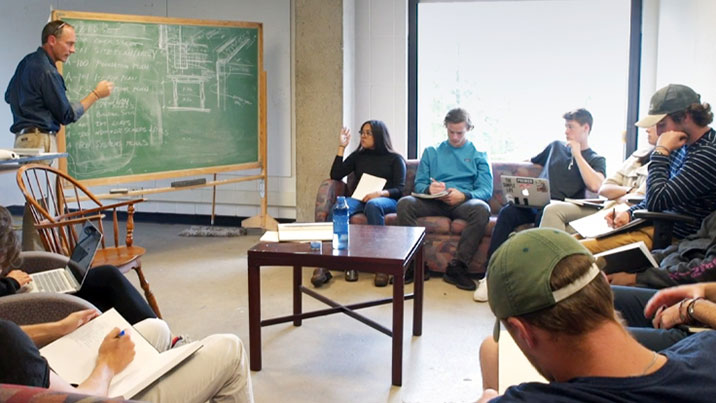
Designing for Real: Architectural Studies classes work with Habitat for Humanity.
Designing for Real: Architectural Studies classes work with Habitat for Humanity.
John McLeod:
Now imagine these rafters, this whole assembly is sloping down and up, right? We’re cutting [crosstalk 00:00:05]… The partnership between Middlebury College and Habitat for Humanity in Addison County came about when Ashley Cadwell, who’s an alum of Middlebury, had this idea for Middlebury College architecture students designing the houses that the local chapter of Habitat for Humanity would build… Who’s doing foundation? You guys were, so that’s the interior.
John McLeod:
It sounded really intriguing and appealing, because, of course it’s a chance for our students to have a real world experience and to go through the whole process that an actual architect experiences… What we want to look at is, in terms of dimensions, and getting the backup turnaround that’s required by the town, how do we lay that out?
John McLeod:
The one caveat that I put on the potential partnership was that it had to be a good design experience for the students. It couldn’t just be the easiest thing to build. It, in fact, had to engage them in a thorough, and fun, and inventive design process. And Habitat, to their credit, they were game and they agreed to that. So I sat down and crafted the best way to lay out the courses and structure them in a series, or a sequence, that would allow us to take the process all the way through.
Emma M.:
These are all the different things we’ve been researching and we have been [crosstalk 00:01:25]-
John McLeod:
Okay.
Emma M.:
… sizing.
John McLeod:
So there is [crosstalk 00:01:29], yeah.
Emma M.:
We just need to organize it more. But we’ve been… When we first began the project, I think knowing that it was a real world project drove the whole design process. So when we started out, we did propose individual approaches. But it quickly became clear that no personal agenda or design idea could be decided. It all came out of what the site was asking for and how these families would occupy these homes. It was clear that this isn’t just a class for a grade. And the difference between forgetting to put in a stud in a wall is whether the house is built or not. It’s not the difference between an A and a B.
Calder Birdsey:
A lot of people would ask me about the class and say, “How are you graded? You don’t really have any assignments. You don’t have to worry about due dates.” Which I would always struggle to respond to them, and say, “It’s not like that. We have this common goal, and none of us really know how to get there. And we’re all kind of figuring it out, as undergraduate architecture students, and learning along the way.”
John McLeod:
I realized when I was planning out the design process in the studios that I really had no choice but to approach it as I would approach a design project in my private practice. Except, the big difference was, instead of one or two of us in the office working on it, I had 14 students, plus myself.
Speaker 2:
This assembly here has a high drying potential. This thing has nothing between it and some very dry outdoor air.
Emma M.:
I think in typical studios, we never get past just the design process. So having to think about codes and permitting was obviously very challenging, especially in the second semester, doing more of the technical work.
John McLeod:
Yes. All right, it’s just this whole thing has to slide up here, which means there’s not room for the parking… Every possible challenge on a project, I think, cropped up during this one. And while difficult in the moment, it was also an incredible opportunity for students to get the full experience. Certainly one of the more challenging aspects of the process was meeting with the Development Review Board at the end of the spring term. They’re actually the body that has the authority to approve or not approve. It’s not uncommon to not get through DRB on the first pass. And we didn’t, in part, because we had some challenges with the size of the lot.
Emma M.:
The town was definitely a little surprised when we proposed to have detached homes, but I think they’ve always admired our goal of having two families, being able to be located close to downtown, in two affordable homes.
John McLeod:
There was a bit of drama there, because we were actually a couple 1,000 square feet short. We had to make sure we complied with the zoning requirements for being able to build two houses on one lot. And over the course of the summer, we were able to negotiate with the land owner to our west, who agreed to convey enough square footage to the lot to enable it to become, as of right, compliant. So then, that set us up to go back to the DRB in the fall semester.
Calder Birdsey:
One of the things that was kind of eye opening for me was to see just how many hoops we had to jump through and, as an architecture student, understanding how complex it really is to get a lot of things done… So one of the things had been mentioned in spring was the holding of the front street edge, and this relates to the changes presented to you last but I just wanted to reiterate that the residents, A, will be holding that front street edge as it’s set by the neighbors to the north and the south… When we finished in the evening, we didn’t know what their ruling was, so we had to wait several hours. And that was a point in the project where we had to reconcile the fact that a lot of the work we did might not actually be completed or reach its final phase, and that was just a fact of the project.
DRB speaker:
Next item is the application by Habitat for Humanity of Addison County. All in favor of the motion say, “Aye.”
DRB group:
Aye.
DRB speaker:
Opposed? All ayes. The motion’s cleared. Other business?
John McLeod:
The Development Review Board was a real board with real authority. So for the students to be able to go through that and make a convincing case, that was an incredible opportunity… I just want to say, I think this is such a win, win, win. You know, for Habitat, we’re getting diligent, thoughtful, and appropriately progressive design of affordable housing in Addison County, which is fantastic. So I just want to thank the students for your great energy and participation. And Dora and family, I hope you enjoy your house for many years to come.
Speaker 3:
The ground is broken.
Calder Birdsey:
To be able to participate in the schematic design, in the design development, and in creating the actual construction documents, and then actually getting to have the hands-on experience of building it, is just so, so rare for so many students.
Emma M.:
The most rewarding part of this project for me was getting a chance to meet more locals in the community and also make a project that the community would want.
John McLeod:
On budget, on time, and to the satisfaction of the client and the user, and to do something sensitive for the environment in the process, it’s like no opportunity I know of. And I’m really excited and looking forward to being part of it into the future.
At Middlebury I'm a better student, a better scientist, and even a better person.”
Student
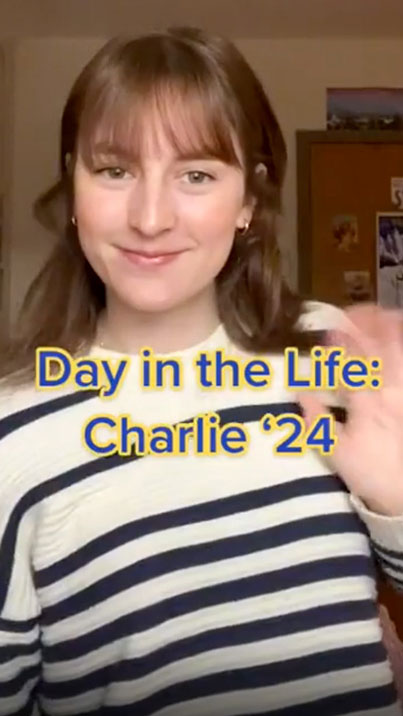
A Day in the Life of a Middlebury College Student.
A Day in the Life of a Middlebury College Student.
Hi, my name is Charlie and I'm a sophomore at Middlebury from Northern California. I'm studying environmental studies and creative writing and this is a Tuesday in my life.
After I woke up, I went to Proctor Dining Hall for a quick breakfast before heading to my first and only class of the day which is an English class called reading literature. And that was down in Davis library. After that I host my radio show every Tuesday from 10 to 11 so I went to the WRMC station. I had no previous radio experience before coming to Middlebury, but I started my show last summer and it has been so much fun.
After that, I went off campus for a little change of scenery and I went downtown to a coffee shop called Little Seed and I got a maple latte and did some homework. After that, I headed back to campus and I went to Atwater Dining Hall to get a quick lunch with my friend Helen and it was super delicious.
And then I went back to my room. I have a single in Gifford Hall, I'm really into collecting postcards and posters so I had a lot of fun decorating my own room. And after that I did some homework. I'm taking a biology class, an English class, a psychology class, and another environmental history class, which I've really enjoyed this semester.
And then I went down to the athletic center for track practice, yay, running. And then I went back up to my room, had some dinner with some friends. I stopped by the library to work on a lab report. And then I ended up watching part of a movie with a friend.
Thanks for following along.

Julius Caesar, performed by a virtually all-female cast of students.

The Theatre Department sponsored Shakespeare’s Julius Caesar, performed by a virtually all-female cast of students—just one of the many integrated classroom works produced during the year.
I went to the Knoll and the sky was so clear. I saw Jupiter and my first shooting star!”
Student
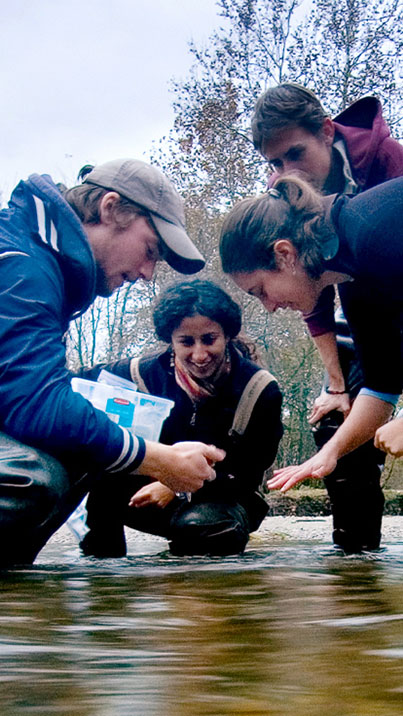
Learning happens everywhere at Middlebury.
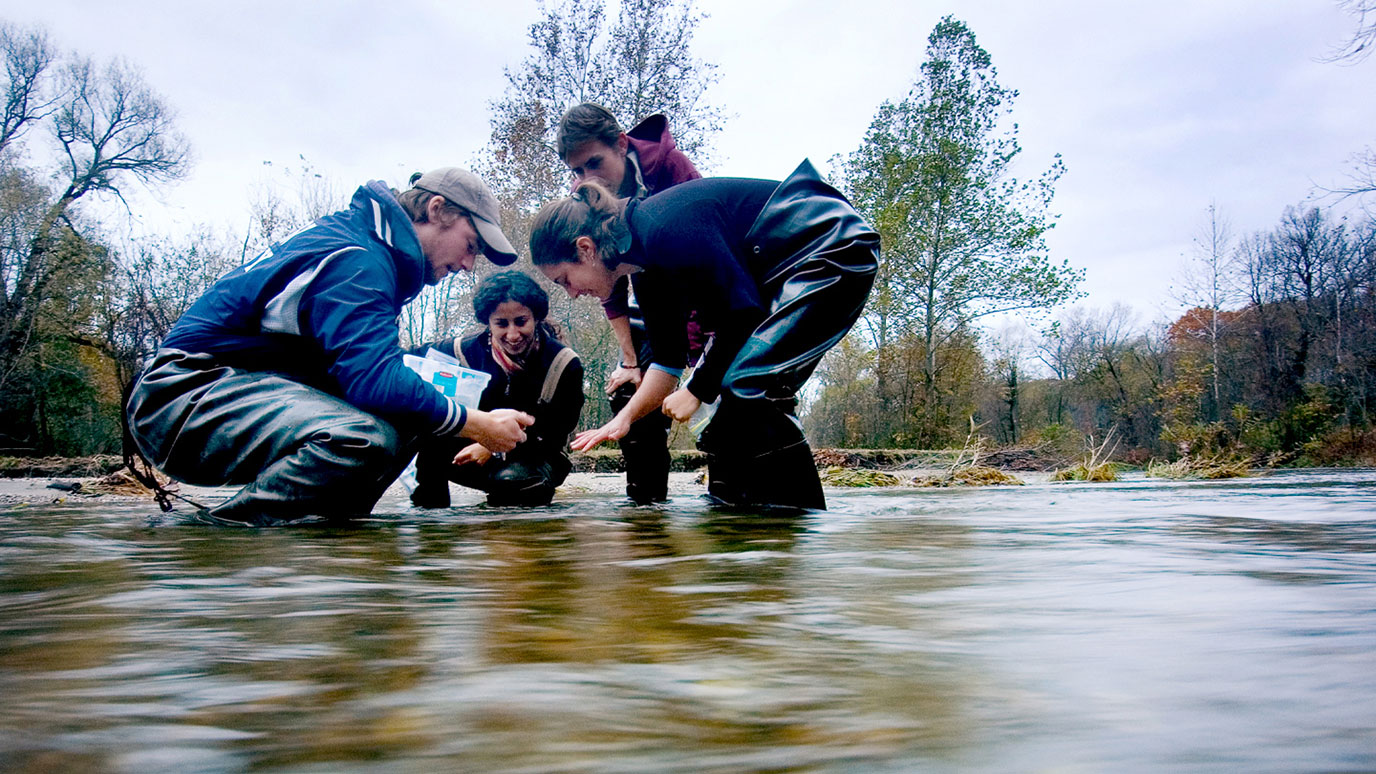
Learning happens everywhere at Middlebury—over lunch, on a mountain, in a river.
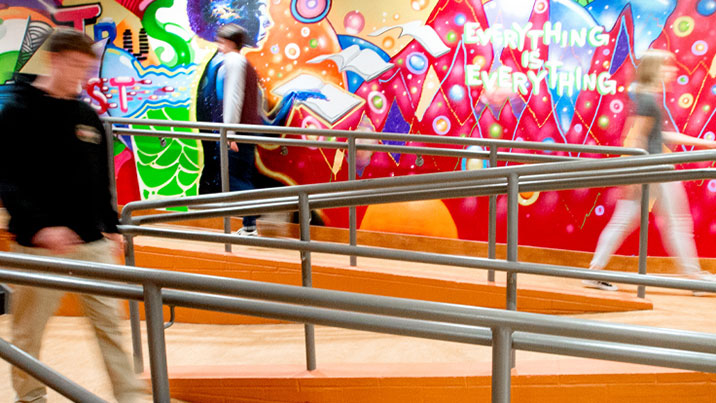
There's a wide range of art into our everyday lives.
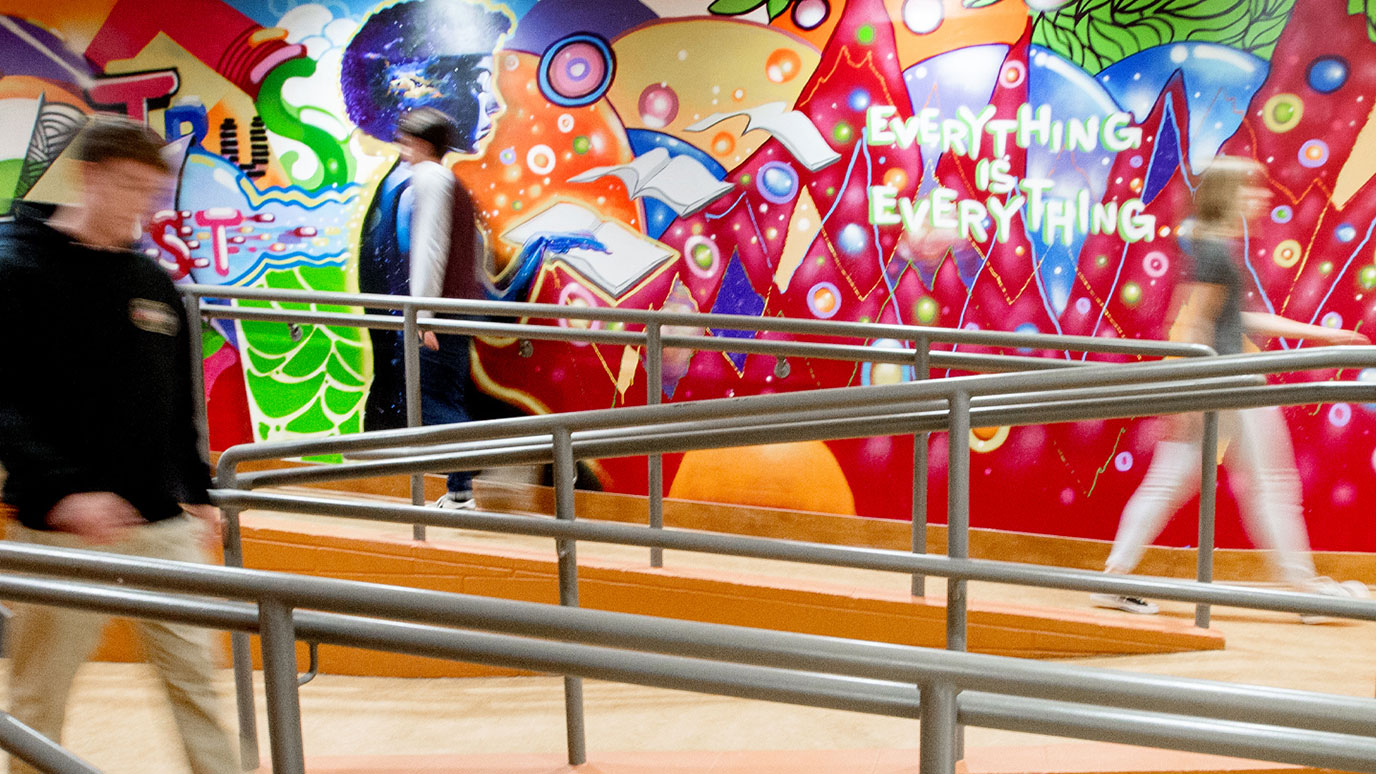
There's a wide range of art into our everyday lives, like this mural in the Student Center that was created by students working with graffiti street artist Will Kasso Condry.
The Vermont landscape and Middlebury campus plays a large role in my happiness and how I live.”
Student
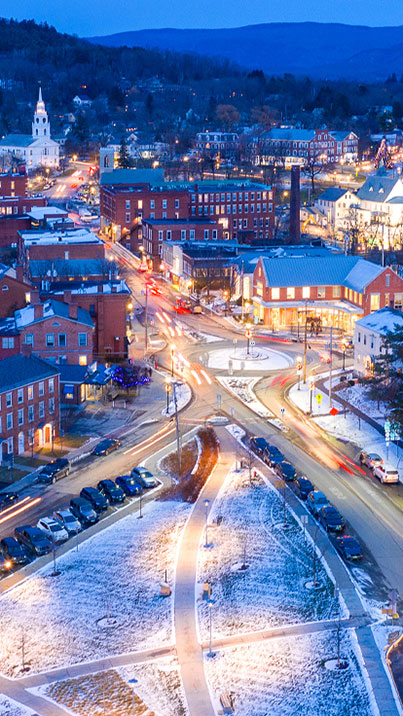
A lively downtown with plenty to do and see.
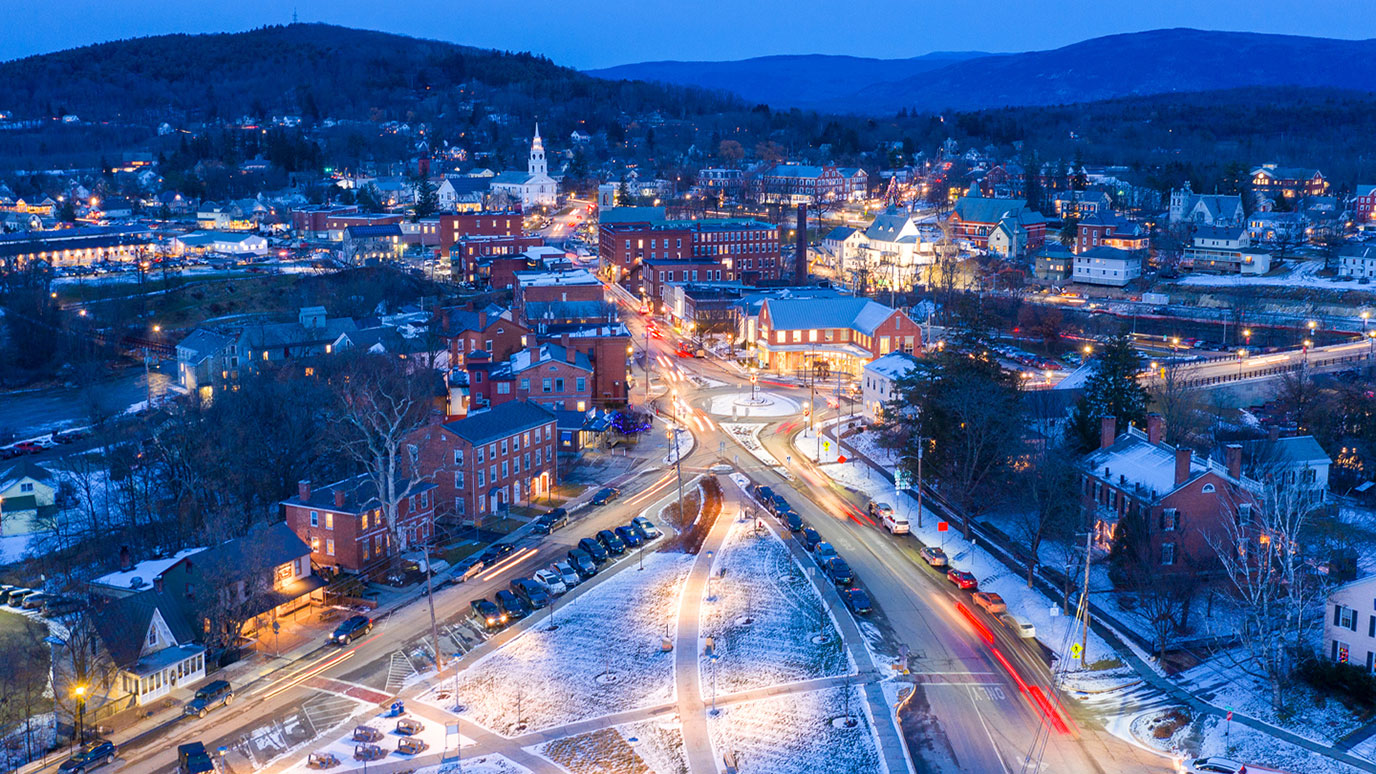
In addition to being a lively downtown with plenty to do and see, Middlebury's also a convenient stop on the Ethan Allen Express train from New York City to Burlington.
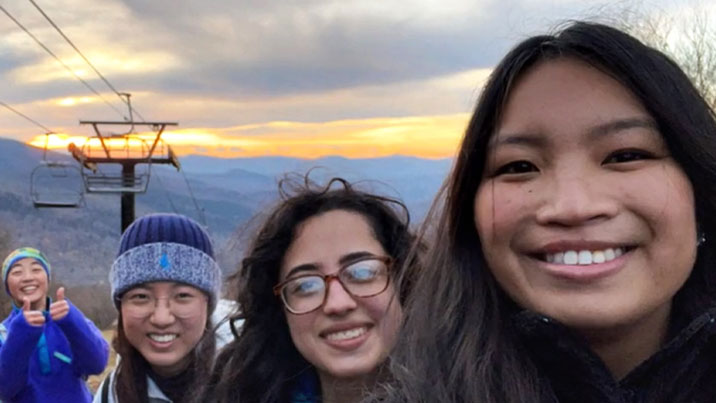
Middlebury 2022 JusticeProjects: Making the Vermont outdoors inclusive for all.
Middlebury 2022 JusticeProjects: Making the Vermont outdoors inclusive for all.
Almost two years ago, Ellie and I started an initiative called Justice Projects, with the main overarching goal meant to promote diversity, equity, and inclusion here on campus. The Justice Projects allow students to pitch, promote, and produce ideas and projects that are meant to support students from historically marginalized backgrounds here on campus.
Last year, over 700 alumni, parents, and friends contributed to our work.
[Roni] One of the projects that we approved last semester is called FIRE, which means Fostering Inclusive Recreational Experiences for students, especially from historically marginalized backgrounds here on campus. The overarching goal of the project was to really get students from these backgrounds out into the beautiful outdoors that Vermont and our Middlebury community has to offer.
Another project is my own, called Swim Lessons. We provided one-on-one, 30-minute lessons by BIPOC students for BIPOC students. This May, Roni and I will be graduating from Middlebury, but that does not mean that Justice Projects is ending. We will be passing along our project to two amazing SGA members.
I’m so excited to continue the work that Ellie and Roni have started. Seif and I share their passion for a Middlebury College community that supports every student regardless of economic background and identity.
And we know with your help, Justice Project will continue to support underrepresented students at Middlebury College.
Alumni support has been crucial for Justice Projects. It has enabled student leaders to create longstanding initiatives that allow for success for all of our community members.
We really hope that you make a contribution to Justice Projects so that we can continue to promote that work and especially put a step forward for diversity, equity, and inclusion on campus. Thank you so much.
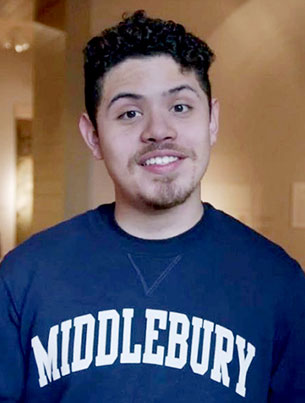
Take a quick campus tour with me!
Take a quick campus tour with me!
(upbeat piano music)
- Hi, I’m Paul.
I’m a senior here at Middlebury,
majoring in religion and English,
and today, I’m going to show you around
our beautiful Middlebury campus.
Right now, we’re outside
the Davis Family Library.
Our three-level library,
open 7:30 to midnight,
in the hub of student life.
The library also boasts
the Technology Helpdesk
for any tech issues you might
have with your Mac or PC.
There’s also the Center for
Teaching, Learning, and Research,
a free resource for
students who need tutoring
or additional academic support.
(gentle upbeat music)
And this is the Axinn
Center for the Humanities.
It’s one of our newest buildings
on campus and very modern,
but it was actually constructed
around the old Starr library,
so there’s quite a bit of history here.
Students love to study here
in the historic reading room
and if not here, right next
door, in the Abernethy room.
Axinn is where you’ll find
the Film and Media Culture,
History, English and American Literatures,
and American Studies Departments.
I actually took a class here last semester,
and the professor asked us to
specifically not write a paper
and instead use the resources
and the tech in the building
to either make a podcast or make a video
or make something completely brand new.
This is McCullough Student Center,
one of the most pivotal parts
of the Middlebury experience.
This is the place for students
to congregate, destress,
play some games, have some food,
and just enjoy their time at Middlebury.
McCullough is home to
Wilson Hall to my right,
our performance space.
It’s also home to our mail center,
our bookstore, our convenience store,
and two retail dining
options for students.
(gentle upbeat music)
This is Hillcrest,
home of the Franklin Environmental Center.
We are very proud that
Middlebury happens to have
the oldest environmental
studies program in the country.
Students can engage in environmentalism
through hands-on work
with local organizations
or at the Knoll, our community garden
that contributes to the
campus dining halls.
This is the Mahaney
Arts Center, or the MAC,
home to the Music, Dance, Theatre,
and Art History Departments.
If you’re looking for a show,
this is the place to be.
Here, you can find our black box theatre
and our dance studio, as
well as our concert hall,
a great place to catch
a TEDx Middlebury talk
or one of our public speaking courses.
We’re in one of the
quietest spots on campus,
the Middlebury College Museum of Art.
It’s completely free
for Middlebury students
and community members.
This is the Peterson
Family Athletics Complex.
We’re a very active community
and we’re very proud to
be part of the NESCAC,
the New England Small
College Athletic Conference.
We have 31 varsity sports
and a handful of club sports,
including soccer, rugby,
and even Quidditch.
All Middlebury College
students have access
to our facilities,
including the field house,
as well as a squash
court, Olympic-size pool,
multilevel fitness center, and gym.
If you’re looking for
something more outdoors,
there’s also the TAM, the
Trail Around Middlebury,
a 19-mile trail that surrounds the town
and neighboring vicinity.
(gentle upbeat music)
I have to head to class,
but here’s my friend Coco,
and he’ll finish the tour.
- Thanks, Paul.
My name is Coco Gruson.
I’m a sophomore majoring
in Japanese studies
and I’ll be your tour guide
for the rest of the day.
Let’s head to the Château.
(gentle upbeat bell music)
Welcome to the Château,
home to the French
Department at Middlebury.
Like many buildings on
campus, the Château serves
as both a residential
and academic building.
I actually have class in the Château
every Tuesday and Thursday
for my Japanese class.
Middlebury is known to have one
of the strongest language
departments in the U.S.,
offering 10 foreign languages
throughout the calendar year.
This is Bi Hall, home to
our science departments.
Some popular majors include
biochemistry, neuroscience,
molecular biology, and geography.
Students foster strong relationships
with their professors
through lab and research,
publication opportunities,
and hands-on work.
To my right, we have Ross Dining Hall,
one of three dining halls on campus.
Our open dining plan gives
students unlimited swipes
and tons of flexibility
with our busy schedules.
They serve a diverse range of food
that can meet any dietary needs.
Over at Proctor, we have
the language tables,
where students order and
converse in a foreign language.
It’s a great opportunity
to immerse yourself
and get some real-life practice.
Behind me is the Anderson Freeman Center,
home to the Middlebury
Intercultural Leadership Coalition,
which includes BSU,
Alianza, Mixed Kids of Midd,
and other affinity organizations.
The AFC is also home to First
@ Midd, a preorientation
for students first in their
family to go to college.
This building also
houses the Prism Center,
a space that centers queer
and trans students through advocacy.
Now, it is important to remember,
going to school in Vermont
means living through all the seasons.
First, we have the beautiful fall foliage.
Then, we get all the snow,
which we take advantage of
here at the Snow Bowl.
Just a short drive from
campus, the Snow Bowl
is one of only two college-owned
ski areas in the U.S.
I might be biased, but ours
is definitely the best.
Middlebury makes sure that outdoors
are accessible for everyone.
Snow Bowl tickets are free for first-years,
and you can borrow top-notch equipment
from the gear room on campus.
If you’ve never skied before,
you can also take ski
lessons during J-term.
We have reached the end of the tour.
Thank you for watching and
we hope to see you soon.
(gentle music)
In my classes, even with my friends, I do a lot of critical thinking about my place in the world and how I interact with it.”
Student
You’ll explore an encompassing liberal arts education that is evolving with the increasingly complex world around us. You’ll build on your Vermont experiences with global opportunities for real and meaningful research, study, and internships. You’ll join a close campus community that celebrates all walks of life, in an environment that is serious about confronting inequality and injustice through critical thinking and compassionate doing. You’ll discover the surprising intensity of group collaborations and the quiet discoveries of independent thought. All in ways that are relevant to today’s world.
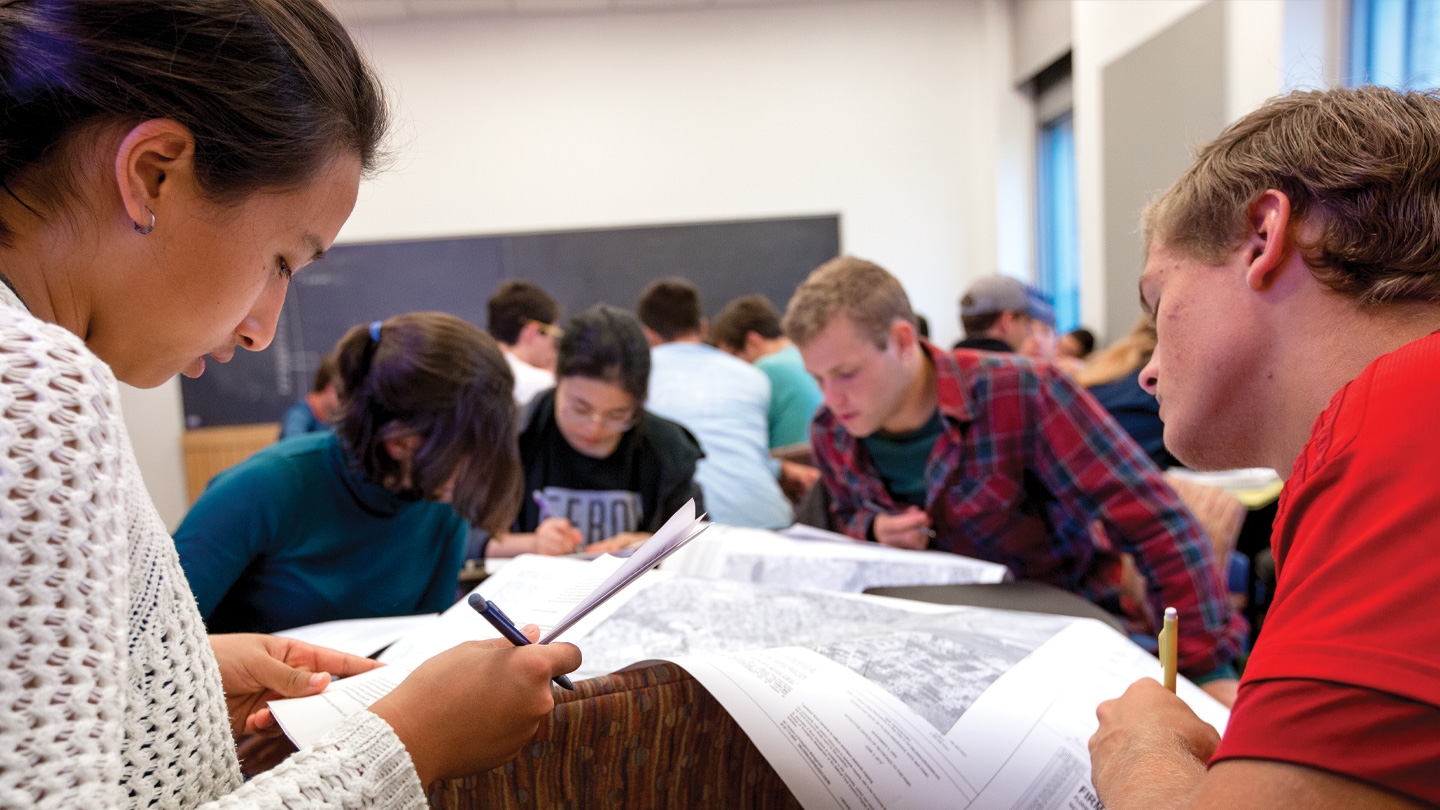
Want to study economics? Combined with architecture? Play soccer and major in neuroscience? At Middlebury, you can. Almost half of each graduating class majors in more than one subject, with multiple opportunities for cross-disciplinary discovery. That is the essence of a Middlebury education. Here, you have the time, space, and support to pursue what interests you!
Middlebury College is a distinctive, energetic, and welcoming community characterized by strong friendships, stimulating coursework, inspiring connections with faculty and staff, and rich experiences in and beyond the classroom. Hear what a few of our students and faculty had to say in the videos below, then visit Student Life to learn more.
I think Middlebury professors are extremely accessible to students. We come to a place like Middlebury because we want to have those interactions with students, whether it’s in the classroom or getting to know you better outside of academics, or providing mentorship for both your career at Middlebury and beyond. Those are the type of interactions that we love. And so we try to provide lots of opportunities for you to have those types of interactions with us. So obviously, in the classroom, that’s one way that we interact with you. But we also have office hours, which are just times every week where students can drop in and talk to us about anything that they want, whether it’s questions that they have about material from class or anything else that they wanna talk about. And most professors have way more office hours than the minimum required, because we just wanna give all of our students opportunities to come. You know, I schedule my office hours based on when students are available to make sure that they can all come and talk to me. And I give students extra credit for class if they come. ’Cause I just want an incentive for students as much as possible to come and have those interactions with me. Lots of professors also have interactions with students outside of class. So like, in the Computer Science Department, we have a barbecue every summer for students who are doing research with us on campus. And I’ve had lots of coffees and lunches with students to just talk about what’s going on in their lives and what they’re thinking about in terms of summer internships, or what classes to take next semester, or whatever they wanna talk about.
One of the reasons I chose to come to Middlebury was because the beautiful landscape we’re surrounded by. We have the Green Mountains to our east and the Adirondacks to our west. Coming from Texas, it’s entirely different than anything I had ever experienced, but I’ve loved the opportunities to go swimming in local swimming holes in the summer, hiking in the fall and spring, snowboarding in the winter, or sledding down the hill in front of the chapel. On the weekends, a lot of times we go to local farmer’s markets either here in our own community or in one of the surrounding communities. I’ve also had the opportunity to volunteer in the local community and get to know people that call this place their home and it’s really safe. I feel comfortable walking home with my friends after a night out, coming back to campus or driving a few hours away down to Burlington with my friends. It’s been a wonderful place to be ingrained in for the last four years, and a lovely place to call home.
As an institution, Middlebury supports inclusivity on campus. For example, first gen, low income first-year students have access to a preorientation program called First@Midd which specifically supports them in their transition into higher education. And beyond that, all year round, students have access to plenty of affinity spaces on campus, such as LASA, the Latin American Student Association, as well as BSU, the Black Student Union, and so many others. And beyond that, Middlebury has a financial commitment to supporting inclusivity. For example, right now, I am currently pursuing an unpaid internship in Costa Rica that I otherwise would not have been able to pursue had it not been for Middlebury’s commitment to inclusivity in so many different ways.
Hi, my name’s Alex Draper. I am the chair of the Theatre Department here at Middlebury. And I’ve been asked to make a short film about where on campus experiential learning takes place. And one of the places is right here in Seeler Studio Theatre where we rehearse, and produce, and present plays. And all of the productions we do in the Theatre Department count as classes. So the students are taking them as an official course. And their time put into rehearsal is recognized as such. And in addition to that, all of the classes that we teach have a practical experiential component. So that everything you’re studying, you’re actually putting into practice in some way. If you’re a costume designer, you are designing, drawing, producing costumes. Same thing, set design, playwriting, acting, directing. All that is applied to work that is actually up on its feet and presented in class or to an audience. In addition to that, the department’s very lucky that we have in the outside-of-the-classroom part of experiential learning, we have a professional theater company, PTP/NYC, that’s been in existence for 34 years now, where we take a company of actors made up of half Middlebury College students and half equity actors. We rehearse up here in New York for three weeks, and we take two shows to New York City and run them in rep for five weeks during the summer. And through that process, students get to take all of the things they’re learning in our classrooms here and apply them to very real-world situations as a small theater company producing work in front of live audiences and reviewers in New York City. So I’m sure there are many more examples across campus of great ways in which experiential learning takes place here, but that’s just a few of the examples from here in the Theatre Department.
Living in a dorm is just so much fun. There’s just endless possibilities, and you really have so many opportunities to really create connections and foster community in your dorm. And there’s just so many people who wanna help when needed and are always down to hang out with you. And you honestly get to get really creative with your living space. And you just make memories in your dorm that will stay with you for years to come. And there are just so many support systems in place, such as your RAs, which are student staff members, and they’re always ready to offer resources and supports for you. Like I’m an RA, for example, and I love talking to my residents, seeing how they’re doing, and just knowing what’s going on with their lives. And there’s also just so many opportunities just for different places to live in dorms here on campus. There are the townhouses, there are special interest houses, and academic interest houses, such as the gender studies, Spanish, Portuguese, and there’s also social houses here, which are really cool to live at.
I think the art scene here is really great. It’s super easy to get involved in, and there are always things going on whether it’s a faculty show or a student-run show. We’ve got a student-run theater, the Hepburn Zoo. I’m in an a cappella group, the Middlebury Mischords, and sometimes we have shows. There’s just so many different ways to get involved or go see something. A really great example of this is we have Nocturne, which is an outdoor arts festival in the spring where students who have been working on dance performances, like, pieces of art, or people will sing or do scenes and they present all over campus, and you can walk around and just see what everyone’s been up to.
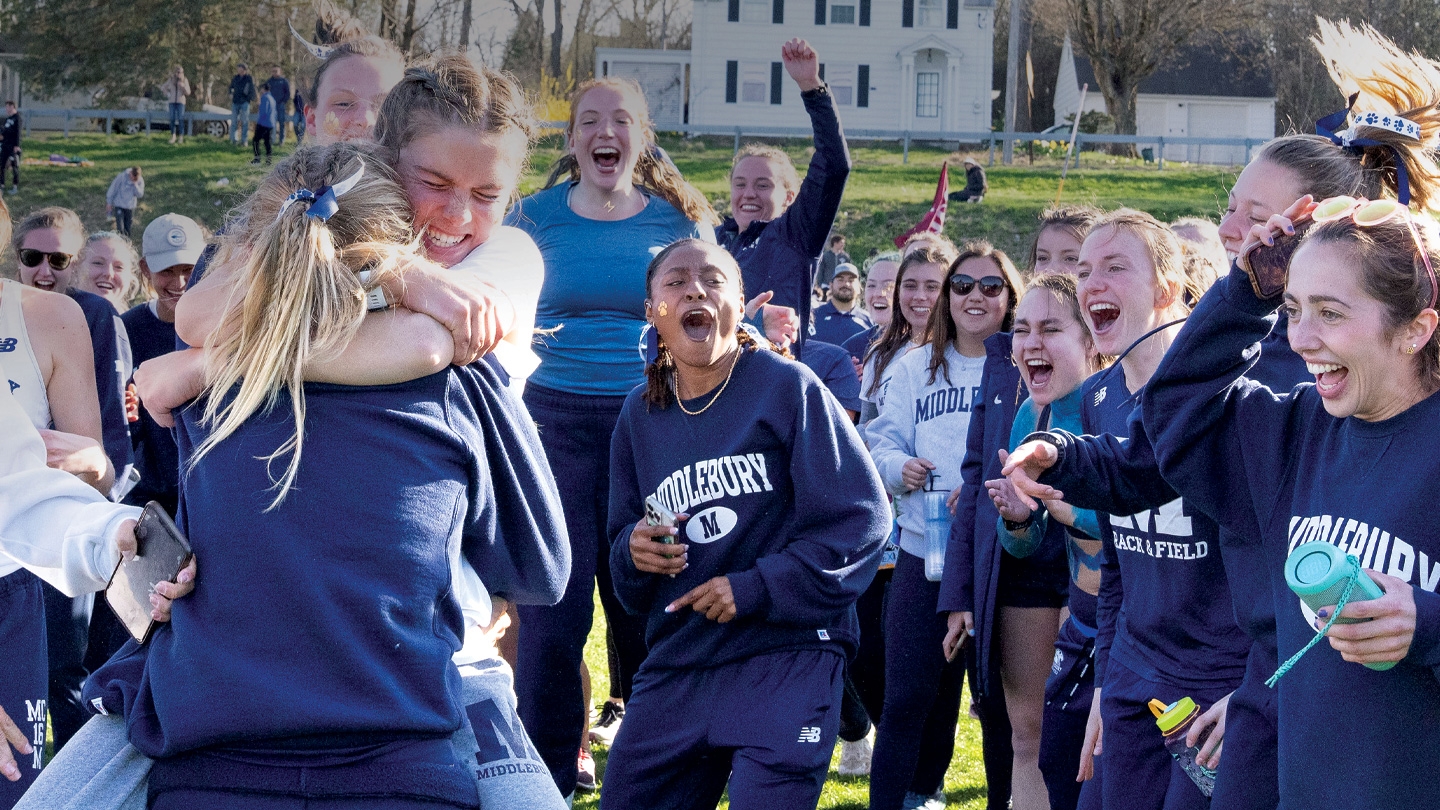
Athletics are an essential part of the educational and social experience at Middlebury College, from intercollegiate sports to overall health and wellness.
Sports at MiddleburyWith 31 NCAA varsity teams and more than 27 percent of students participating, Middlebury’s teams and traditions create a strong sense of community.
Visit AthleticsIntramurals offer organized team sports for students and faculty alike, and often include playoffs for a healthy combination of intensity and camaraderie. Club sports provide intercollegiate competition and and rely on student leadership.
More About TeamsCollege life can be exciting and stressful all at once, and Middlebury offers plenty of opportunities for healthy fitness in the facilities open to all throughout campus.
Athletic Facilities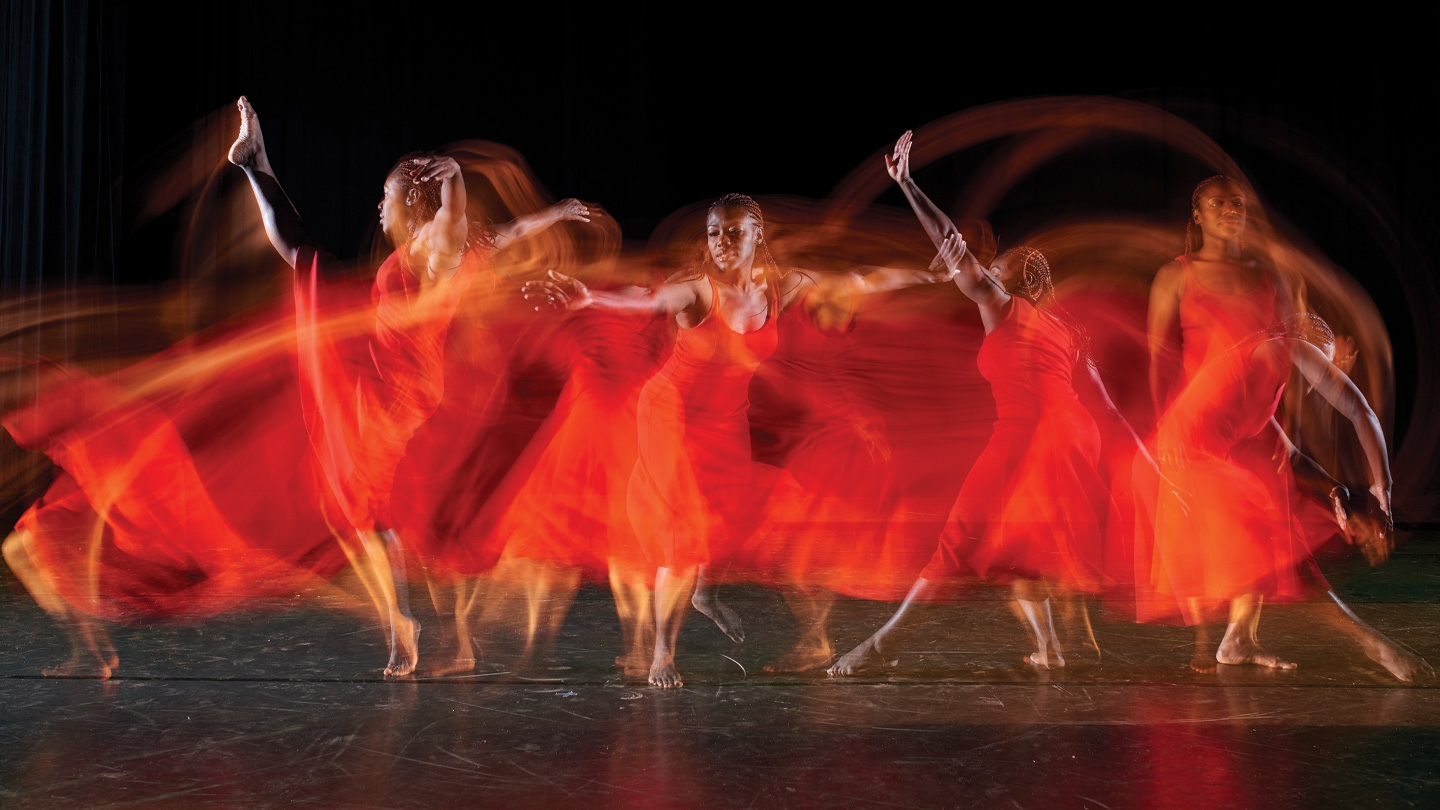
We are painters and sculptors, actors and songwriters; we attend gallery openings and rock concerts. Our students, faculty, and staff engage with the arts as both creators and viewers. Much of our arts activity happens in the Mahaney Arts Center (MAC), but the making and appreciation of art happens everywhere—on campus, in town, throughout New England and the world.
Scholarship and research at Middlebury College can happen in a classroom or a lab, in a local river or a far-away field, in Chile or Monterey, California. An undergraduate education at Middlebury is an immersive experience with the world—a global education—whether in Vermont, at any of our Schools Abroad, our Language Schools, the Middlebury Institute, or anywhere else you want to go.
Undergraduate Language Departments
Our robust offering of intensive language learning allows students to begin or improve on their language skills, creating opportunities for future learning in Middlebury’s internationally focused schools and programs.
Middlebury Schools Abroad
Experience total immersion in the language and culture of your study abroad country. You’ll have an authentic learning experience at a local academic institution—not an American school—plus the guided independence to engage with your community.
Language Schools
Each summer we welcome students from all walks of life (ages 18 to 80+) and all parts of the world who show the potential and desire to succeed. Together we create one of the most effective language-learning environments.
Middlebury Institute of International Studies at Monterey
Spend a semester or year in California at the Middlebury Institute and gain practical professional skills with top-tier graduate school faculty—you can even start your master’s degree before you graduate from college.
Here’s a sampling of the kinds of exciting things happening around our campus in any given year.
On his first day in office Middlebury’s seventeenth president shared a message with the campus communities.
Campus locations in Vermont, Monterey, and Oxford offer a wide array of study options.
Vice President for Communications and Marketing David Gibson will step down at the end of June. Associate Vice President for Public Affairs Julia Ferrante has been appointed interim vice president for Communications and Marketing.
Explore our departments.
Majors and MinorsLearn more about Middlebury.
Request InfoSee Middlebury for yourself.
VisitMiddlebury is affordable.
Financial Aid
